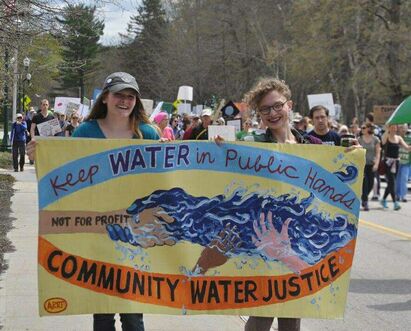
At their August 20 town meeting, Brownfield residents voted 136-17 to enact a new “Town of Brownfield ME Water Extraction Ordinance.” The ordinance puts limits on how much groundwater can be pumped from local wells. It also ensures the town can stop water extraction if testing demonstrates that groundwater levels are falling. In addition, the ordinance also bars large-scale extraction for bottling and sale, and puts controls on water-related truck traffic.
The Brownfield ordinance is lengthy—27 pages—but is a model for any municipality seeking to protect its water sources. It sets a standard for an open, transparent, evidence-based and democratic process to protect water resources, and spells out the “acts or omissions” that constitute a violation. You can read it online at https://bit.ly/2ksVMFl.
The ordinance bans water extraction if withdrawals aggregate more than 20,000 gallons a day. For smaller withdrawals, a permit, valid for one year, is required. A public hearing and comment period is part of the permitting process.
Drawing from the experiences of neighboring towns, the ordinance also requires any trucking operations related to water pumping to go through a detailed technical traffic road impact and noise analysis. The goal is to protect local roads from the damage caused by water trucks. Fully loaded, these trucks can weigh up to 100,000 lbs, four times the weight for which Brownfield roads are designed. Late night and early morning noise was also another concern: trucking operations are therefore limited to the hours of 7 a.m. to 7 p.m.
The ordinance also specifies that if groundwater levels at monitored locations drop more than three inches below the mean monthly level the town can order the pumping operation to stop immediately until water levels start to rise.
After the August 20 vote, Jamie Riel, Brownfield Concerned Citizens member, said: “Brownfield now has an ordinance that gives the town greater levels of protection. It offers financial protection from costs associated with application, monitoring, and/or operation of a water extraction operation. It offers protection to our water resource for current and future generations by limiting potential extractions and includes safeguards for the overall health of the aquifer. And, finally, it offers protections for the community from potential adverse impacts of an extraction operation. We are grateful for the community’s patience and support through this process.”
Nickie Sekera of Community Water Justice, a network of front-line communities against water privatization in Maine, said: “The community of Brownfield is showing to be a leader in our region — not only through taking pre-emptive actions to protect their most valuable water sources, but also to build equity and accountability within their home-rule authority. We look forward to more towns following this lead by taking preemptive action in protecting themselves from exploitative interests.
Our climate crisis is impacting rainfall, with more prolonged droughts and fiercer downpours. This “drought or deluge” pattern in turn impacts recharge rates for aquifers. Add in more groundwater contamination from industrial agriculture, industry, aging infrastructure, fracking, and the military, and it’s clear that even “water rich” areas of the country need to conserve and protect this vital resource.
But where people see a need for precaution, bottling companies see quick profits. Consumers can say “no” to bottled water, but it’s just as important that towns stand up for their rights and the rights of Mother Earth. The result can be an ordinance like Brownfield’s, which limit water pumping, or rights of nature ordinances that give the environment legal standing, as was passed in Barnstead, NH to protect water there. We hope that what happens in Brownfield sets a precedent for similar ordinances in other towns, and we are ready to help make that happen.

 RSS Feed
RSS Feed
